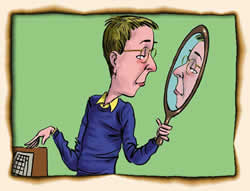Difference between NPD and HPD
Key Difference: Narcissistic Personality Disorder (NPD) is a medical disorder in which people exhibit unstable and intensive emotions. The patient experiences an inflated sense of self-importance and superiority compared to others. Histrionic Personality Disorder (HPD) is a mental disorder in which people are more emotionally vulnerable and require constant approval from their peers. They are also associated with inappropriately seductive, dramatic, flirtatious, exaggeration, manipulative and self-indulgence behavior.
Narcissistic Personality Disorder (NPD) and Histrionic Personality Disorder (HPD) are two different medical conditions that can affect a person’s ability to live a normal stress free life. These two conditions are often confused as they have a few similar symptoms. A person suffering from NPD is constantly concerned about his own well-being and considers himself to be superior and very important compared to others. A person suffering from HPD requires constant attention and is always trying to be the center of attention. These are two different medical conditions and should be considered as such.
 Narcissistic Personality Disorder (NPD) is a medical disorder in which people exhibit unstable and intensive emotions. The patient experiences an inflated sense of self-importance and superiority compared to others. Web MD defines the disorder as, “Narcissistic personality disorder is further characterized by an abnormal love of self, an exaggerated sense of superiority and importance, and a preoccupation with success and power.” Patients suffering from this disorder actually suffer from insecurity and a fragile self-esteem and are believed to be use self-absorption to conceal these issues. These patients also lack empathy for other people.
Narcissistic Personality Disorder (NPD) is a medical disorder in which people exhibit unstable and intensive emotions. The patient experiences an inflated sense of self-importance and superiority compared to others. Web MD defines the disorder as, “Narcissistic personality disorder is further characterized by an abnormal love of self, an exaggerated sense of superiority and importance, and a preoccupation with success and power.” Patients suffering from this disorder actually suffer from insecurity and a fragile self-esteem and are believed to be use self-absorption to conceal these issues. These patients also lack empathy for other people.
Narcissistic personality disorder was discovered in 1968 and was originally referred to as megalomania. The term ‘narcissistic’ is derived from the Greek youth Narcissus, who fell in love with his own reflection on the banks of a river. Similarly, people that are associated with his condition are often believed to exhibit symptoms like falling in love or having an obsession with oneself. Research suggests that men are more prone to be diagnosed with this condition than women. NPD patients often exhibit behavioral traits such as arrogance, lack of empathy, dominance, superiority and crave power. They are also less likely to commit to relationships and will often leave a person who they believe is going to leave them.
The DSM Fourth Edition lists the symptoms as:
- Reacting to criticism with anger, shame, or humiliation
- Taking advantage of others to reach own goals
- Exaggerating own importance, achievements, and talents
- Imagining unrealistic fantasies of success, beauty, power, intelligence, or romance
- Requiring constant attention and positive reinforcement from others
- Becoming jealous easily
- Lacking empathy and disregarding the feelings of others
- Being obsessed with self
- Pursuing mainly selfish goals
- Trouble keeping healthy relationships
- Becoming easily hurt and rejected
- Setting goals that are unrealistic
- Wanting "the best" of everything
- Appearing unemotional
There are no known causes of the NPD; however, psychologists Leonard C. Groopman and Arnold M. Cooper compiled a list of causes based on various different researches. A variety of different situations such as childhood trauma, relationship with parents, environmental factors are all known to affect the patient. The list of causes is as follows:
- An oversensitive temperament at birth
- Excessive admiration that is never balanced with realistic feedback
- Excessive praise for good behaviors or excessive criticism for bad behaviors in childhood
- Overindulgence and overvaluation by parents, other family members, or peers
- Being praised for perceived exceptional looks or abilities by adults
- Severe emotional abuse in childhood
- Unpredictable or unreliable caregiving from parents
- Valued by parents as a means to regulate their own self-esteem
Theodore Million divided the NPD into five subtypes. Wikipedia lists these subtypes as:
- Unprincipled narcissist – including antisocial features. A charlatan who is a fraudulent, exploitative, deceptive and unscrupulous individual.
- Amorous narcissist – including histrionic features. The Don Juan or Casanova of our times who is erotic, exhibitionist.
- Compensatory narcissist – including negativistic (passive-aggressive), avoidant features.
- Elitist narcissist – variant of pure pattern. Corresponds to Wilhelm Reich's "phallic narcissistic" personality type.
- Fanatic narcissist – including paranoid features. An individual whose self-esteem was severely arrested during childhood, who usually displays major paranoid tendencies, and who holds on to an illusion of omnipotence. These people are fighting delusions of insignificance and lost value, and trying to re-establish their self-esteem through grandiose fantasies and self-reinforcement. When unable to gain recognition or support from others, they take on the role of a heroic or worshipped person with a grandiose mission.
Psychotherapy has been proven the most effective when trying to deal with the disorder. Schema therapy and cognitive therapy are two types of therapies that have been used to help people cope with the disorder. Though NPD is not curable, it can be treated to the point that it does not disrupt the patient’s daily life and activities. Medication may also be used for certain symptoms.

Histrionic Personality Disorder (HPD) is a mental disorder in which people are more emotionally vulnerable and require constant approval from their peers. They are also associated with inappropriately seductive, dramatic, flirtatious, exaggeration, manipulative and self-indulgence behavior. Histrionic disorder is considered to be more commonly diagnosed in women compared to men. Men that exhibit similar symptoms are often diagnosed with narcissistic personality behavior. People suffering from HPD are actually pretty successful and high-functioning individuals that are social and outgoing. They also are constantly the center of attention and will do anything, including wear bright and obnoxious clothing, make loud noises and say almost anything to keep the attention to themselves.
HPD patients are fast to excite and fast to burn out. For instance, they will fall in love fast and will also take it hard when the relationship ends. They may also seek treatment for clinical depression when their relationships die. People suffering from HPD also constantly change jobs as they can quickly become bored and frustrated. They also crave excitement and can also place themselves in risky situations to acquire it. HPD can be caused by childhood trauma such as death or illness in the family. It can also be caused by distant attitudes of parents, where the child may not have received the love and attention that he/she may require. Genetics is also considered as one of the causes for the disorder.
Psychology Today lists the symptoms of HPD as:
- Constantly seeking reassurance or approval
- Excessive dramatics with exaggerated displays of emotion
- Excessive sensitivity to criticism or disapproval
- Inappropriately seductive appearance or behavior
- Overly concerned with physical appearance
- Tendency to believe that relationships are more intimate than they actually are
- Self-centeredness, uncomfortable when not the center of attention
- Low tolerance for frustration or delayed gratification
- Rapidly shifting emotional states that appear shallow to others
- Opinions are easily influenced by other people, but difficult to back up with details
- Being easily influenced by other people
- Blaming failure or disappointment on others
Psychologist Theodore Million classifies the disorder into six subtypes. Wikipedia lists the subtypes as:
- Appeasing: features of dependent personality disorder and obsessive-compulsive personality disorder
- Disingenuous: features of antisocial personality disorder
- Infantile: features of borderline personality disorder
- Tempestuous: negativistic (passive-aggressive) features
- Theatrical: overtly dramatic, romantic, and attention-seeking
- Vivacious: the seductiveness of the histrionic mixed with the energy typical of hypomania
Psychotherapy is one of the most effective ways to treat the disorder. Cognitive therapy is one of the therapies that are used when dealing with HPD. Medication may also be used in order to treat some symptoms such as depression. Though HPD is not curable, it is treatable to the point where a person can cope with HPD without it disrupting his/her daily life.
|
|
Narcissistic |
Histrionic |
|
Definition |
Narcissistic personality disorder is a medical condition in which a person exhibits unstable and intense emotions. The patient has an abnormal love of self and believes he is superior and important compared to others. |
Histrionic personality disorder is a medical condition in which a person exhibits excessive emotionality, need for approval, attention-seeking and seductive behavior. They have a high need for attention and will do anything to acquire it. |
|
Symptoms |
Reacting to criticism with anger, shame, or humiliation, taking advantage of others to reach own goals, exaggerating own importance, achievements, and talents, imagining unrealistic fantasies of success, beauty, power, etc., requiring constant attention and positive reinforcement from others, becoming jealous easily, lacking empathy and disregarding the feelings of others, being obsessed with self, pursuing mainly selfish goals, trouble keeping healthy relationships, becoming easily hurt and rejected, setting goals that are unrealistic, wanting "the best" of everything and appearing unemotional. |
Constantly seeking reassurance or approval, excessive dramatics with exaggerated displays of emotion, excessive sensitivity to criticism or disapproval, inappropriately seductive appearance or behavior, overly concerned with physical appearance, tendency to believe that relationships are more intimate than they actually are, self-centeredness, uncomfortable when not the center of attention, low tolerance for frustration or delayed gratification, rapidly shifting emotional states that appear shallow to others, opinions are easily influenced by other people, but difficult to back up with details. |
|
Causes |
The exact cause of the disorder is unknown. A list compiled from researches includes: An oversensitive temperament at birth, overindulgence and overvaluation by parents, valued by parents as a means to regulate their own self-esteem, excessive admiration that is never balanced with realistic feedback, unpredictable or unreliable caregiving from parents, severe emotional abuse in childhood, being praised for perceived exceptional looks or talents by adults, learning manipulative behaviors from parent. |
Childhood trauma, death in the family, lack of love as a child and genetics are some of the causes of HPD. |
|
Types |
NPD has been unofficially been divided into five types by Theodore Million: Unprincipled narcissist, Amorous narcissist, Compensatory narcissist, Elitist narcissist and Fanatic narcissist. |
Million divides HPD into six subtypes: Appeasing, Disingenuous, Infantile, Tempestuous, Theatrical and Vivacious. |
|
Treatment |
Psychotherapy and other forms of mixed therapy can be used to help the patient. |
Psychotherapy |
Image Courtesy: dba-oracle.com, buzzle.com









Comments
keh1016
Tue, 09/13/2016 - 00:13
Add new comment